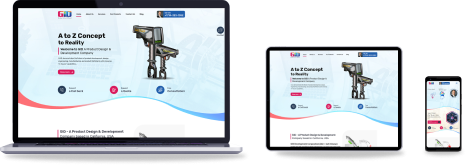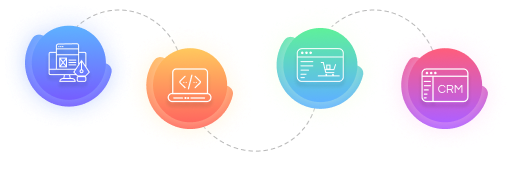
Mastering Software Delivery with Effective Scrum Development
Scrum development has become the backbone of modern software delivery for businesses seeking faster results, predictable timelines, and continuous improvement. At Concept Infoway, our approach to software engineering revolves around this proven framework because it ensures transparency, collaboration, and flexibility across all project stages.
Through Scrum development, we enable teams to deliver functional increments quickly, helping clients in the United States transform ideas into scalable, production-ready systems. Our goal is to shorten delivery cycles without compromising quality, ensuring every release increment supports strategic objectives and tangible value creation.
As a technology partner, Concept Infoway goes beyond standard process adherence. Our certified Scrum Masters and experienced scrum developers work cohesively with clients to translate complex requirements into actionable user stories and deliverables. This collaborative rhythm minimizes delays, increases adaptability, and strengthens overall project alignment.
We believe the true strength of Scrum development lies in its empirical foundation. Our teams inspect, adapt, and deliver consistently within time-boxed iterations, supported by continuous integration and automated quality checks. Concept Infoway’s structured yet flexible model is tailored for enterprises that expect both speed and precision from their software development lifecycle.
Whether building new systems or modernizing legacy platforms, our disciplined application of Scrum development ensures consistent progress, transparent communication, and measurable success across every engagement.
Boost software delivery efficiency with Scrum mastery!
Contact Us Today!
Scrum Development Foundations for Reliable Delivery
What Scrum Development Is—and Isn’t
Scrum development is an iterative and incremental framework designed to manage complex software projects through structured collaboration, time-boxed cycles, and continuous feedback loops. At Concept Infoway, we employ this framework to enhance both predictability and adaptability within every delivery pipeline.
Unlike linear methodologies, Scrum development emphasizes learning and evolution. Each sprint functions as a complete mini-cycle of planning, execution, testing, and review, allowing our teams to integrate feedback efficiently and continuously refine outcomes.
Principles, Empiricism, and Iterative Value
The foundation of Scrum development is built on empirical process control—transparency, inspection, and adaptation. Concept Infoway implements these principles to ensure complete visibility at every layer of the project lifecycle. Teams inspect progress daily and adapt plans based on real-time findings to keep quality and efficiency aligned.
This process helps businesses reduce delivery risks while ensuring software aligns closely with their evolving objectives. Through this approach, we make each sprint a focused opportunity to deliver incremental business value and measurable improvements.
Why Scrum Development Differs from “Mini-Waterfall”
Many organizations misunderstand Scrum development as a shorter version of traditional project management. Concept Infoway’s approach demonstrates its true nature—flexible, adaptive, and feedback-driven.
Instead of defining requirements in bulk, our process evolves through incremental discovery and development. This adaptability enables rapid pivoting when priorities shift without derailing entire projects. Each iteration concludes with a tangible product increment, providing immediate insight into progress and return on investment.
This structured agility forms the cornerstone of our delivery model, ensuring we stay responsive while maintaining control over scope, quality, and time.
Core Roles and Accountabilities in Scrum Development
Scrum development thrives on clearly defined roles that promote balance between autonomy and accountability. At Concept Infoway, these roles create the foundation of effective collaboration and responsible execution throughout every sprint.
Product Owner, Scrum Master, and Scrum Developers
The Product Owner ensures business alignment by managing the backlog and prioritizing features that deliver maximum value. The Scrum Master enforces framework integrity, facilitates ceremonies, and removes impediments that could delay progress.
Our skilled scrum developers bring technical expertise and discipline to transform user stories into shippable increments. Together, these roles maintain momentum, ensure clarity, and reinforce a delivery rhythm that meets both technical and business goals.
Boundaries, Decision Rights, and Collaboration Patterns
At Concept Infoway, every role within Scrum development operates within well-defined boundaries. Decision rights are distributed to empower individuals while maintaining governance.
The Scrum Master facilitates processes but does not dictate solutions; the Product Owner sets priorities but values input from scrum developers. This balanced structure promotes innovation, ownership, and accountability—essential qualities for consistent success in iterative delivery.
Events and Artifacts That Power Scrum Development
The heartbeat of Scrum development lies in its recurring events and well-maintained artifacts. Concept Infoway upholds these structures rigorously to ensure consistency, transparency, and measurable progress across projects.
Sprint Planning, Daily Scrum, Review, and Retrospective
Every sprint begins with Sprint Planning, where objectives, timelines, and scope are collaboratively defined. The Daily Scrum keeps the team aligned and helps surface blockers early. Sprint Reviews engage stakeholders to inspect deliverables, while Retrospectives focus on identifying improvement opportunities.
This rhythm ensures that teams remain focused, collaborative, and continuously evolving. By maintaining this cycle, Concept Infoway ensures continuous learning and process improvement without disrupting delivery cadence.
Product Backlog, Sprint Backlog, and the Increment
Artifacts serve as anchors of transparency in Scrum development. The Product Backlog captures all potential deliverables, constantly refined to reflect shifting priorities. The Sprint Backlog outlines immediate sprint commitments, providing a tactical execution view.
Each completed iteration results in an Increment—a tangible product outcome that adds measurable value. Through disciplined artifact management, Concept Infoway maintains visibility for stakeholders, ensures accountability, and keeps teams synchronized throughout the delivery lifecycle.
By integrating these principles, roles, and events, Concept Infoway leverages Scrum development to build reliable, scalable, and business-aligned software solutions. Every engagement benefits from our structured delivery model and the collaborative excellence our scrum developers bring to each project.
Transform your development process through Agile Scrum!
Contact Us Today!
How Concept Infoway Implements Scrum Development
Scrum development at Concept Infoway is executed with precision, discipline, and adaptability to match client goals and business complexity. Our implementation model blends global delivery efficiency with a local understanding of business challenges faced by organizations across the United States. By aligning agile strategy with measurable outcomes, we ensure every sprint produces tangible progress that drives lasting value.
Sprint Cadence, Definition of Ready, and Definition of Done
Timeboxing, Capacity, and WIP Discipline
Every Scrum development project at Concept Infoway begins with defining the right sprint cadence. We adopt two-to-four-week sprint cycles that maintain predictability while leaving room for adaptation. Each sprint is timeboxed to safeguard team focus and reduce work-in-progress overload, ensuring no task undermines delivery velocity.
Capacity planning forms the backbone of this structure. Our Scrum Masters evaluate each developer’s bandwidth before planning commitments, promoting sustainable productivity rather than overextension. This discipline ensures consistent sprint performance, transparent tracking, and steady delivery momentum.
“Done” Criteria for Code, Tests, Security, and Documentation
To maintain uniform quality across projects, Concept Infoway defines a comprehensive “Definition of Done” that goes beyond code completion. Every product increment must meet strict quality, testing, and documentation benchmarks before being considered complete.
This process ensures that software increments emerging from Scrum development are not only functional but also production-ready. Each task passes through a clear validation pipeline—automated testing, peer reviews, and security checks—so that nothing moves forward unless it meets our standards for excellence.
Backlog Management and Prioritization
Outcome-Driven User Stories and Acceptance Criteria
Effective backlog management is central to Scrum development success. At Concept Infoway, the Product Owner collaborates closely with stakeholders to create user stories that are focused on measurable outcomes. Each story contains explicit acceptance criteria that define success clearly and prevent misalignment during execution.
This disciplined approach allows our scrum developers to focus on solving business challenges rather than simply delivering features. The result is a backlog that evolves with project priorities while ensuring traceable and results-driven development progress.
Refinement Flow and Estimation Readiness
Refinement sessions are essential to Concept Infoway’s Scrum development process. Before stories enter a sprint, our teams break down large tasks into manageable units, evaluate dependencies, and ensure estimation readiness.
This continuous refinement reduces ambiguity and strengthens forecasting accuracy. By maintaining a dynamic backlog, Concept Infoway ensures that each sprint is guided by clear goals, relevant priorities, and well-prepared work items that align with stakeholder expectations.
Tooling, Dashboards, and Traceability
Boards, Burndown, Cumulative Flow, and Release Views
Concept Infoway leverages industry-standard tools to support visibility and performance tracking throughout Scrum development. Our dashboards display sprint progress through burndown and cumulative flow diagrams, giving both internal teams and clients real-time insight into delivery health.
Transparency is maintained at all times, allowing stakeholders to monitor progress, identify blockers, and participate in value-driven decision-making. This clarity promotes trust, collaboration, and accountability across the delivery ecosystem.
Audit Trails for Compliance and Change Control
Traceability is vital for software projects operating under compliance requirements. Our Scrum development framework ensures that every change, update, and decision is recorded through audit trails. This documentation is essential for clients in regulated industries where traceability and governance cannot be compromised.
By combining agile flexibility with compliance rigor, Concept Infoway enables businesses to enjoy the benefits of Scrum development without losing oversight or control.
Engagement Models with a Scrum Development Firm
Partnering with a Scrum development firm like Concept Infoway provides organizations with a structured yet adaptive path to scaling agile software delivery. Our engagement models are designed to match diverse business needs, ensuring that each client receives the optimal blend of agility, expertise, and cost efficiency.
Dedicated Scrum Team Led by a Certified Scrum Master
Cross-Functional Pods and Embedded Product Ownership
Concept Infoway builds dedicated Scrum development teams structured around specialized roles and skills. Each pod consists of scrum developers, QA engineers, UI/UX designers, and a Scrum Master who leads collaboration and ensures framework compliance.
To maintain alignment, we embed Product Owners directly within client teams. This close integration accelerates decision-making, minimizes feedback loops, and strengthens ownership across sprints. The result is a seamless blend of technical delivery and business responsiveness.
Governance Rhythm with U.S. Stakeholders
Our governance model ensures ongoing synchronization between delivery teams and U.S.-based stakeholders. Weekly reviews, sprint demos, and retrospectives provide complete visibility into project progress. This rhythm ensures that expectations remain clear, outcomes stay measurable, and decisions are made collaboratively.
Such structured communication is the hallmark of our Scrum development practice, helping clients stay engaged and informed without administrative overload.
Team Augmentation with Expert Scrum Developers
Skill Profiles, Interview Support, and Ramp-Up Plans
For clients who need flexibility in scaling their workforce, Concept Infoway offers team augmentation through highly skilled scrum developers. These professionals integrate smoothly into existing client frameworks, contributing technical strength and agile maturity from day one.
We allow clients to participate in interviews and skill assessments, ensuring every developer aligns with their standards and culture. Ramp-up plans are defined collaboratively to guarantee seamless onboarding and immediate productivity.
IP Protection, NDAs, and Secure Access Controls
Security and confidentiality are central to our operations as a trusted Scrum development firm. We implement strong IP protection measures, NDAs, and access controls to maintain the integrity of client data.
From infrastructure to code repositories, every element is governed by secure processes that comply with global data protection norms. This ensures that businesses can innovate confidently while maintaining strict control over intellectual property.
Pilot-to-Program: From Discovery Sprint to Roadmap
Success Criteria, Exit Gates, and Scale-Up Readiness
Concept Infoway’s pilot-to-program approach allows businesses to validate the Scrum development process before large-scale adoption. Each pilot sprint serves as a test environment for collaboration efficiency, delivery cadence, and quality assurance.
At the conclusion of each pilot phase, predefined success criteria and exit gates are reviewed jointly with the client. If validated, the engagement transitions seamlessly into a full-scale delivery roadmap, maintaining momentum without loss of continuity.
This structured scale-up approach ensures predictable growth, steady delivery quality, and ongoing optimization. Concept Infoway’s adaptability, combined with the technical depth of our scrum developers, enables clients to expand capacity confidently while maintaining full governance and transparency.
Through these flexible engagement models, Concept Infoway demonstrates why partnering with a specialized Scrum development firm provides more than staffing support—it delivers a complete framework for success, innovation, and continuous improvement.
Planning and Estimation in Scrum Development
Scrum development thrives on predictability achieved through data-driven planning and transparent estimation. At Concept Infoway, we integrate structured estimation models and forecasting techniques that balance agility with accountability. This approach enables our clients to gain a clear view of delivery capacity, potential risks, and time-to-market expectations without losing the flexibility inherent in agile methods.
Story Points, Capacity Planning, and Velocity Modeling
Relative Estimation and Forecast Accuracy
Concept Infoway uses relative estimation methods such as story points to evaluate the complexity and effort of each task. This practice ensures that estimation is based on experience rather than guesswork. Over successive sprints, our scrum developers refine accuracy through empirical data gathered from completed work.
By leveraging sprint velocity—the measure of completed story points per iteration—we create reliable forecasts for future delivery. This structured approach to estimation provides clarity, reduces uncertainty, and allows for transparent communication between our teams and stakeholders throughout every Scrum development project.
Handling Spikes, Technical Debt, and Non-Functional Work
While features often take the spotlight, Concept Infoway recognizes that non-functional requirements and technical spikes are equally vital. Our teams dedicate planned capacity for exploration, refactoring, and optimization tasks. This ensures that performance, scalability, and maintainability remain consistent across releases.
Incorporating these factors within Scrum development cycles allows us to balance innovation with stability. By managing technical debt proactively, we prevent long-term bottlenecks and maintain product quality across evolving software landscapes.
Release Planning and Forecasting with Empirical Data
Probabilistic Forecasts and Confidence Bands
At Concept Infoway, we take planning beyond sprint-level commitments by building probabilistic release forecasts. These models use historical data from previous iterations to generate confidence bands around expected outcomes. This allows clients to make informed decisions about release dates and resource allocation.
Our forecasting model ensures that every Scrum development plan remains dynamic, data-informed, and realistic. The use of metrics-driven insights minimizes surprise factors while maintaining transparency about progress and potential challenges.
Communicating Scope, Date, and Risk to Executives
Effective stakeholder communication is an essential element of Scrum development. Concept Infoway structures its reporting to clearly present trade-offs between scope, schedule, and resources. By maintaining continuous dialogue with business executives, we ensure alignment between product vision and delivery execution.
This consistent communication empowers leadership teams to make strategic decisions with confidence. Our ability to bridge technical detail with business context defines Concept Infoway as a trusted Scrum development firm for enterprises that prioritize reliability and visibility.
Dependency and Risk Management
Interface Contracts and Integration Calendars
Complex projects often involve multiple teams, vendors, or systems. To manage dependencies effectively, Concept Infoway maintains interface contracts that define integration expectations and shared ownership across teams.
By mapping dependencies and maintaining integration calendars, we ensure smooth coordination between distributed teams and eliminate schedule disruptions. This level of discipline strengthens Scrum development practices, reducing risk while maintaining delivery flow across sprints.
Mitigation Plans and Change-Request Pathways
Every project carries inherent risks, but Concept Infoway minimizes them through structured mitigation frameworks. We assess potential issues early, define contingency measures, and document change-request pathways for traceability.
Our teams continuously monitor risks through sprint retrospectives and backlog refinements. This proactive mindset, supported by consistent process control, ensures that Scrum development outcomes remain stable even under evolving project dynamics.
Quality Engineering Inside Scrum Development
In Scrum development, quality is not an afterthought—it is built into every phase of delivery. Concept Infoway’s approach integrates testing, automation, and continuous validation to ensure that every increment meets functional and non-functional expectations. By embedding quality assurance directly within sprints, our teams maintain high performance without extending timelines or compromising release cadence.
Testing Strategy: Unit, API, UI, and Non-Functional
Shift-Left Quality, Test Data, and Environments
Concept Infoway applies a shift-left testing strategy that embeds quality checks early in the development process. Testing begins during the design phase, allowing defects to be detected before code reaches integration. This not only saves time and cost but also increases overall system reliability.
We maintain dedicated environments and test data management practices to simulate real-world conditions. This helps our scrum developers validate usability, performance, and security well before deployment. Integrating testing early ensures that every step of Scrum development contributes to long-term stability.
Acceptance Test Automation and Traceability
Automation forms the foundation of our testing process. Every user story includes corresponding automated acceptance tests that confirm expected behavior and functionality. Concept Infoway ensures traceability from user stories to test cases, guaranteeing that business requirements are verified with precision.
By aligning automation with Scrum development, we accelerate validation cycles and maintain confidence in frequent releases. The outcome is higher product quality delivered faster and more predictably.
CI/CD and DevOps Enablement for Scrum Development
Trunk-Based Development, Feature Flags, and Rollbacks
Continuous Integration and Continuous Deployment (CI/CD) are integral to Concept Infoway’s Scrum development process. Our teams use trunk-based development and feature flags to streamline collaboration and reduce merge conflicts. This allows for safer, incremental deployment without affecting user experience.
Incorporating rollback mechanisms and canary releases further strengthens delivery confidence. These practices ensure resilience and quick recovery, keeping production environments stable even when changes are frequent.
Observability, Error Budgets, and Release Health
Monitoring and observability play a critical role in ensuring operational reliability. Concept Infoway implements error budgets and health metrics to track the stability of each release. By integrating performance and uptime analytics into Scrum development, we ensure that every release is both functional and resilient.
Our DevOps teams continuously monitor release health, enabling rapid incident response and long-term reliability. This holistic integration of development and operations enhances delivery confidence across all projects.
Secure-by-Design Practices Within Sprints
Threat Modeling, SAST/DAST, and SBOM Hygiene
Security is treated as a shared responsibility within Scrum development. Concept Infoway incorporates secure-by-design principles into every sprint, identifying risks early through structured threat modeling. Automated tools like Static Application Security Testing (SAST) and Dynamic Application Security Testing (DAST) are embedded within CI/CD pipelines for ongoing validation.
Our scrum developers also manage Software Bill of Materials (SBOM) documentation, ensuring transparency around third-party components and dependencies. These practices guarantee that all releases meet compliance and security requirements without slowing delivery.
Compliance Alignment for Regulated Industries
For clients operating in regulated environments, Concept Infoway tailors its Scrum development workflows to align with industry standards such as HIPAA, PCI DSS, and SOC 2. We maintain rigorous documentation, access controls, and audit readiness to ensure compliance is never compromised.
This proactive attention to governance allows clients to operate confidently, knowing that their software meets both technical and regulatory benchmarks. Through this secure and disciplined approach, Concept Infoway delivers Scrum development excellence that balances agility with accountability at every stage of the software lifecycle.
Communication, Transparency, and Stakeholder Engagement
Clear communication and transparency form the backbone of effective Scrum development. At Concept Infoway, we emphasize structured collaboration and open information flow between all stakeholders. This ensures that business owners, project managers, and technical teams maintain shared understanding and alignment throughout every sprint. Our communication approach transforms software delivery from a linear workflow into a collaborative ecosystem of accountability, visibility, and trust.
Sprint Reviews That Demonstrate Value, Not Just Demos
Outcome Narratives and ROI-Oriented Showcases
Sprint Reviews within Scrum development are more than demonstrations of completed work—they are value-oriented discussions. Concept Infoway uses these sessions to connect delivered functionality with measurable business outcomes. Each review highlights improvements in performance, efficiency, or user experience, showcasing tangible returns on investment.
By focusing on outcomes rather than outputs, Concept Infoway bridges the gap between technical achievement and business relevance. This allows stakeholders to see not only what was built but also why it matters, strengthening collaboration and commitment to shared goals.
Feedback Capture and Decision Logs
Continuous feedback is essential to sustainable improvement in Scrum development. During Sprint Reviews and Retrospectives, Concept Infoway documents stakeholder feedback and key decisions within decision logs. These records provide traceability, allowing teams to understand the rationale behind every adjustment.
This practice supports informed prioritization and transparent accountability, ensuring that the development roadmap remains aligned with evolving client expectations. As a trusted Scrum development firm, Concept Infoway uses these mechanisms to keep all voices heard and all insights actionable.
Reporting and Metrics in Scrum Development
Burndown, Burnup, and Cumulative Flow Diagrams
Metrics serve as objective indicators of progress and predictability. Concept Infoway maintains dashboards displaying burndown and burnup charts, as well as cumulative flow diagrams. These visual tools offer real-time insights into remaining work, completed deliverables, and overall project stability.
By integrating these metrics into our Scrum development rhythm, we make performance transparent to both internal teams and clients. This ensures that stakeholders can confidently assess progress, capacity, and overall project health.
DORA Metrics, Lead Time, and Flow Efficiency
In addition to standard agile metrics, Concept Infoway tracks DevOps Research and Assessment (DORA) indicators such as deployment frequency, change failure rate, and recovery time. These provide a deeper understanding of software delivery efficiency.
By analyzing lead time and flow efficiency, our teams identify improvement areas that reduce cycle time and increase throughput. This continuous evaluation helps our scrum developers sustain predictable delivery and consistent quality over long-term engagements.
Managing Scope Change Without Derailing Cadence
Guardrails, Re-Prioritization, and Trade-Offs
Scope changes are inevitable in dynamic projects, but they need not disrupt progress. Concept Infoway manages evolving priorities through structured change-control guardrails. When new requirements emerge, they are analyzed for impact on schedule, resources, and sprint capacity.
This disciplined approach ensures that Scrum development remains agile yet stable. Re-prioritization decisions are made collaboratively with clients, ensuring that trade-offs are transparent and business-driven.
Exception Handling and Escalation Paths
To maintain continuity during change or risk events, Concept Infoway defines clear escalation paths. This ensures that concerns are resolved quickly without slowing the overall delivery cadence. Our project governance model empowers team members to flag issues early, maintaining alignment across roles.
By embedding these practices within Scrum development, we protect both team focus and project integrity. This balanced governance ensures agility without sacrificing quality or accountability.
Scaling Scrum Development Across Multiple Teams
As organizations grow, maintaining agility at scale becomes a strategic necessity. Concept Infoway’s approach to scaling Scrum development is designed to preserve team autonomy while achieving cross-functional coordination. Our model enables multiple Scrum teams to collaborate seamlessly without diluting the principles of transparency, adaptability, and continuous improvement that define Scrum.
Synchronization: Scrum of Scrums and Integration Sprints
Shared Backlogs, Definition of Done, and Release Trains
When multiple teams collaborate on complex systems, alignment becomes critical. Concept Infoway employs the Scrum of Scrums framework to synchronize activities, manage dependencies, and standardize shared definitions of success.
All teams operate under a unified Definition of Done, ensuring consistency in deliverables. Shared backlogs provide visibility across workstreams, while coordinated release trains align increments into cohesive, deployable outcomes. This structure keeps large-scale Scrum development initiatives coherent and well-orchestrated.
Architecture Runway and Enabler Work
In scaling environments, Concept Infoway maintains an architecture runway that supports incremental innovation without disrupting development flow. Our scrum developers and architects collaborate to establish enabler stories that prepare the technical foundation for future capabilities.
This proactive alignment ensures that architecture evolves alongside features, preventing rework and maintaining scalability. Through this system, Scrum development scales efficiently while preserving the agility and speed of smaller teams.
Product Ownership at Scale
Backlog Hierarchies, Roadmaps, and OKR Alignment
Effective scaling requires product ownership structures that promote clarity and focus. Concept Infoway implements backlog hierarchies—connecting epics, features, and user stories—to maintain visibility from strategy to execution.
We align product roadmaps with business Objectives and Key Results (OKRs), ensuring that every sprint contributes directly to measurable organizational goals. This structured approach keeps Scrum development aligned with enterprise vision while maintaining flexibility to adapt to market shifts.
Discovery Tracks and Dual-Track Agile
Concept Infoway also incorporates dual-track agile practices, running discovery and delivery tracks simultaneously. While scrum developers work on current sprint commitments, the discovery team explores upcoming features and technical opportunities.
This overlapping rhythm allows teams to plan ahead without interrupting active delivery cycles. It creates a continuous pipeline of validated ideas that flow smoothly into future sprints, strengthening the predictability and responsiveness of Scrum development.
Governance Without Bottlenecks
Decision Forums, RACI, and Risk Committees
To sustain quality and control at scale, Concept Infoway establishes governance forums that oversee risks, dependencies, and stakeholder alignment. These forums follow RACI principles—clarifying roles for those responsible, accountable, consulted, and informed.
By maintaining structured oversight, we ensure that governance supports rather than constrains agility. Decisions are made swiftly, guided by transparent metrics and collaborative discussion. This eliminates the bottlenecks often associated with traditional hierarchical models.
Measuring Business Outcomes at Portfolio Level
Beyond team-level metrics, Concept Infoway evaluates success based on portfolio outcomes. We measure cycle efficiency, feature adoption, and customer satisfaction to ensure that scaled Scrum development initiatives deliver lasting business value.
Our data-driven reviews help organizations refine investment strategies, optimize resource allocation, and identify improvement areas. Through this balance of governance and autonomy, Concept Infoway enables businesses to scale Scrum development confidently, achieving enterprise-wide agility without compromising efficiency or control.
Selecting the Right Scrum Development Firm
Choosing the right Scrum development firm is one of the most critical decisions for any organization transitioning toward agile software delivery. The ideal partner brings not only process expertise but also cultural alignment, transparency, and technical depth. At Concept Infoway, we position ourselves as an extension of your business, combining proven Scrum frameworks with hands-on experience in managing distributed teams and complex digital initiatives.
Evaluation Criteria and Due Diligence
Domain Fit, Security Posture, and Toolchain Compatibility
Selecting a Scrum development partner begins with evaluating their domain expertise and alignment with your industry’s technical and regulatory requirements. Concept Infoway emphasizes contextual understanding before engagement, ensuring that every solution fits both operational goals and compliance expectations.
We also prioritize compatibility between our delivery toolchain and client infrastructure. This includes synchronization with version control systems, testing frameworks, and communication platforms. As a seasoned Scrum development firm, Concept Infoway integrates seamlessly with client ecosystems, maintaining full security and performance standards across every environment.
Reference Architectures and Delivery Playbooks
Beyond tools, proven frameworks are essential for consistent delivery. Concept Infoway has developed internal playbooks and reference architectures that accelerate onboarding, establish delivery rhythm, and uphold best practices throughout Scrum development.
These assets serve as reusable templates, reducing setup time while maintaining flexibility for customization. Our structured yet adaptable approach ensures that clients benefit from established methodologies without sacrificing creative problem-solving or innovation.
Onboarding Best Practices with a Scrum Development Firm
Environment Setup, Access, and Ways of Working
The onboarding phase defines how effectively collaboration unfolds over time. Concept Infoway manages onboarding through structured environment setup, secure access management, and alignment on work protocols. All development environments, tools, and permissions are established before the first sprint to ensure uninterrupted progress.
Clear communication channels and sprint planning routines are introduced from day one. Our scrum developers participate in collaborative ceremonies, ensuring a shared understanding of priorities, dependencies, and objectives. This disciplined preparation sets the foundation for a stable and transparent engagement.
Sprint 0 Goals and Roadmap Shaping
Concept Infoway uses Sprint 0 as the initiation point for all Scrum development projects. During this phase, we define product backlogs, finalize sprint durations, and agree on a delivery roadmap aligned with client expectations. This sprint also allows us to calibrate capacity, estimate velocity, and establish governance parameters.
By front-loading planning and alignment, we reduce future ambiguity and accelerate measurable progress. Sprint 0 serves as the launchpad for consistent delivery, enabling stakeholders to begin the journey with confidence and clarity.
Commercials and SLAs That Reward Outcomes
Throughput, Quality, and Cycle-Time Commitments
Concept Infoway structures its service-level agreements to reward measurable results rather than mere activity. Our SLAs focus on throughput, defect ratios, and cycle-time consistency, ensuring that Scrum development remains outcome-oriented.
We align business incentives with delivery performance, reinforcing mutual accountability. This transparency ensures that both our teams and our clients are invested in achieving the same goals—delivering high-quality software, faster and smarter.
Incentives Aligned to Value Delivery
Our engagement model is built to reflect the value we deliver. For long-term projects, Concept Infoway incorporates milestone-based rewards linked to successful release cycles, customer satisfaction, and quality benchmarks.
This performance-linked approach promotes continuous improvement and ensures that each sprint contributes to the client’s strategic objectives. By structuring contracts around shared success, Concept Infoway redefines what it means to partner with a Scrum development firm—building relationships grounded in trust, transparency, and tangible business value.
Hiring and Managing Scrum Developers
Hiring the right scrum developers can define the success of any agile transformation. At Concept Infoway, we recruit professionals who combine technical proficiency with a deep understanding of collaboration, adaptability, and stakeholder empathy. Our management approach emphasizes empowerment, skill development, and alignment with client goals, ensuring every team functions as a cohesive, high-performing unit.
Competencies for High-Performing Scrum Developers
T-Shaped Skills, Collaboration, and Craft Excellence
Successful scrum developers are characterized by T-shaped skill sets—a blend of broad technical understanding and deep specialization. Concept Infoway’s hiring framework evaluates candidates on coding expertise, cross-functional collaboration, and adherence to best practices.
Our developers are trained to contribute beyond their immediate technical responsibilities. They actively engage in sprint planning, backlog refinement, and testing activities. This multi-dimensional participation ensures that Scrum development projects maintain agility without compromising technical rigor.
Communication, Stakeholder Empathy, and Ownership
Beyond technical skill, we emphasize communication and empathy. Concept Infoway’s scrum developers are trained to listen, interpret feedback, and align technical decisions with business priorities. They take ownership of outcomes rather than tasks, fostering a culture of accountability and shared responsibility.
This combination of technical acumen and soft skills ensures that our teams integrate effortlessly into client environments, maintaining harmony across diverse roles and geographies.
Distributed Collaboration and Time-Zone Coverage
Async Rituals, Documentation, and Handoffs
With global teams and cross-time-zone projects, asynchronous collaboration is essential. Concept Infoway has developed structured rituals—status updates, documentation standards, and scheduled handoffs—to ensure continuous progress.
By maintaining comprehensive documentation and well-defined transition protocols, we minimize delays and miscommunication. This disciplined approach enables Scrum development to thrive in distributed setups, preserving the speed and quality of on-site collaboration.
Secure Remote Development and Tooling Standards
Security remains paramount in distributed environments. Concept Infoway enforces secure coding practices, access management, and encrypted communication across all development tools. Every remote workstation and repository complies with enterprise-grade security requirements.
Our adherence to these standards ensures that Scrum development can scale globally without compromising confidentiality or data protection. It also instills client confidence that distributed teams operate under the same level of discipline and control as in-house teams.
Performance Without Anti-Patterns
Avoiding Over-Specialization and Proxy Roles
Scrum development functions best when teams operate as integrated units rather than siloed specialists. Concept Infoway encourages cross-training and knowledge sharing to prevent dependency on single individuals. Our structure ensures that knowledge is evenly distributed, promoting team resilience and continuity.
We also discourage the emergence of proxy roles—individuals who act as intermediaries rather than active contributors. Every scrum developer is encouraged to participate directly in discussions, eliminating bottlenecks and ensuring collaborative ownership of every sprint.
Continuous Learning and Pair/Mob Practices
Learning is an ongoing priority at Concept Infoway. We implement continuous improvement frameworks that include pair programming, mob development, and knowledge-sharing sessions. These practices enhance code quality, foster collaboration, and accelerate problem-solving.
By embedding a learning culture within every engagement, Concept Infoway ensures that its scrum developers remain adaptable and innovative. This approach allows clients to benefit from evolving expertise, consistent performance, and long-term delivery excellence within every phase of Scrum development.
Risks, Anti-Patterns, and How Concept Infoway Avoids Them
Every organization practicing Scrum development must confront risks and anti-patterns that can undermine agility, collaboration, and delivery predictability. Concept Infoway’s experience as a leading Scrum development firm enables us to identify these challenges early and implement structured remedies that keep projects on course. Our frameworks prioritize process discipline, transparency, and team empowerment to prevent recurring inefficiencies that often plague long-term agile projects.
Common Pitfalls in Scrum Development
Cargo-Cult Ceremonies and Invisible Work
One of the most common pitfalls in Scrum development occurs when teams perform ceremonies mechanically, losing sight of their intended purpose. At Concept Infoway, we ensure that every event—whether Sprint Planning or Retrospective—retains its strategic focus on value creation, not just compliance.
Invisible work, such as untracked maintenance or unplanned research, is another risk we address proactively. Our scrum developers document all ongoing tasks within sprint backlogs, ensuring that every effort contributes to measurable outcomes. This transparency eliminates hidden dependencies and ensures that progress is both visible and verifiable.
Overloaded Sprints and Scope Creep
Overcommitting during sprint planning leads to unnecessary stress and missed deadlines. Concept Infoway’s planning discipline prevents such overloads by grounding sprint commitments in data-backed velocity metrics. We prioritize achievable goals to ensure consistent delivery flow.
Scope creep, another major challenge, is managed through structured change control. Any adjustment to sprint objectives undergoes impact analysis and stakeholder review before acceptance. This approach ensures that Scrum development remains adaptable but never chaotic, preserving predictability and stakeholder confidence.
Ceremony and Role Smells
Proxy Product Owners and Command-and-Control Masters
A frequent anti-pattern in Scrum development arises when roles lose their intended focus. Proxy Product Owners—those who act without true business authority—often distort prioritization. At Concept Infoway, we maintain direct access between genuine decision-makers and delivery teams, preserving alignment between business vision and technical execution.
Similarly, we avoid command-and-control behavior from Scrum Masters. Instead, our Scrum Masters serve as facilitators who guide teams through self-organization and continuous improvement. This leadership style cultivates trust and autonomy, ensuring sustainable progress across sprints.
Status Meetings Disguised as Daily Scrums
Daily Scrums are often misused as status-reporting sessions. Concept Infoway trains teams to use these meetings for synchronization, issue identification, and collaborative planning. Our scrum developers communicate blockers and dependencies in a problem-solving context rather than hierarchical reporting.
By restoring the original intent of these ceremonies, we maintain a culture of agility, openness, and accountability. This focus helps teams sustain momentum and collaboration across distributed environments.
Recovery Playbooks and Turnarounds
Retro-Driven Experiments and Guardrails
Concept Infoway treats retrospectives as engines of evolution within Scrum development. Each session results in actionable experiments designed to test small, incremental improvements. We introduce guardrails—structured limits that ensure experiments remain controlled and measurable.
This iterative approach helps our teams continuously refine processes, address pain points, and sustain a healthy delivery cadence. Over time, the cumulative impact of these improvements enhances both quality and velocity across engagements.
Stabilize, Optimize, and Scale Path
When projects face instability, Concept Infoway applies a three-phase turnaround strategy: stabilize, optimize, and scale. In the stabilization phase, we restore sprint predictability through clear prioritization and capacity assessment. Optimization then focuses on refining workflows, removing bottlenecks, and strengthening collaboration.
Finally, the scale phase reintroduces expansion and long-term innovation. This recovery model ensures that struggling Scrum development projects regain balance quickly and move toward consistent value delivery without compromising transparency or quality.
Compliance, Security, and IP Considerations
As digital ecosystems become increasingly interconnected, compliance and data security have become non-negotiable components of every Scrum development engagement. Concept Infoway integrates governance frameworks and secure engineering practices into each stage of delivery. This ensures that our clients meet regulatory obligations while maintaining agility, efficiency, and trust in their software operations.
Data Residency, HIPAA/PCI/SOC 2 Awareness
Access Controls, Audit Trails, and Secrets Hygiene
For clients operating under strict regulatory environments, Concept Infoway enforces access management, logging, and encryption policies throughout the development lifecycle. Role-based permissions ensure that team members access only the data required for their responsibilities.
Audit trails document every code commit, merge, and deployment action, providing a complete chain of custody for all activities. By incorporating these measures into Scrum development, we preserve transparency and compliance with frameworks such as HIPAA, PCI DSS, and SOC 2.
Secrets management is also a top priority. Our scrum developers adhere to stringent encryption protocols for credentials and API keys, ensuring that sensitive data is never exposed in repositories or pipelines. These practices reinforce our position as a security-conscious Scrum development firm trusted by businesses across diverse industries.
Licensing, OSS Governance, and SBOM Management
Third-Party Risk, Pen Testing, and Vendor Reviews
Modern software development frequently involves third-party components and open-source libraries. Concept Infoway manages this complexity through automated license scanning and Software Bill of Materials (SBOM) generation. These measures ensure complete visibility into dependencies and compliance with intellectual property requirements.
We also conduct periodic penetration testing and vendor assessments to evaluate the security posture of integrated solutions. This proactive governance minimizes vulnerabilities and ensures that external components meet enterprise-grade standards. Integrating such checks directly within Scrum development safeguards both product reliability and business reputation.
Continuous Compliance and Legal Readiness
Compliance is not a one-time achievement but an ongoing process. Concept Infoway embeds compliance checks into CI/CD pipelines, ensuring that each deployment meets evolving legal and regulatory standards. This automation allows teams to maintain compliance effortlessly while focusing on delivery speed.
By integrating continuous validation, we ensure that projects remain audit-ready at all times. This alignment of compliance with agility allows clients to scale Scrum development initiatives confidently, knowing that legal obligations and data protection requirements are fully met.
Through its emphasis on secure architecture, disciplined governance, and proactive auditing, Concept Infoway safeguards the integrity of every engagement. By merging agility with accountability, we help businesses achieve compliance excellence within the fast-paced world of Scrum development.
Frequently Asked Questions – FAQ
What is Scrum development and how does it work?
Scrum development is an agile framework that structures software projects into short, repeatable cycles known as sprints. Each sprint delivers a working product increment that moves the project closer to completion. Concept Infoway applies this framework to promote transparency, collaboration, and adaptability, enabling teams to respond quickly to feedback and evolving business needs while maintaining consistent quality.
Is Scrum development the same as Agile, or how do they differ?
Scrum development is a methodology that operates under the Agile umbrella. While Agile defines a set of principles emphasizing flexibility and collaboration, Scrum specifies a concrete process for achieving them. At Concept Infoway, we use Scrum to convert Agile theory into practical, measurable results—helping clients gain the benefits of adaptability without losing control over scope or timelines.
How long should a sprint last in Scrum development?
A typical sprint in Scrum development lasts between two and four weeks, depending on the project’s complexity and objectives. Concept Infoway tailors sprint durations to suit client needs, ensuring a balance between rapid delivery and thorough validation. This predictable rhythm allows scrum developers to maintain focus and consistently deliver functional increments of high quality.
What does a Scrum Master do for a software team?
A Scrum Master acts as a facilitator, guiding the team through Scrum ceremonies, enforcing process discipline, and removing obstacles that hinder progress. At Concept Infoway, our Scrum Masters foster collaboration, promote self-organization, and ensure adherence to agile principles. Their leadership helps scrum developers maintain productivity, accountability, and alignment with project goals.
What do scrum developers handle day to day?
Scrum developers focus on turning user stories into working software through coding, testing, and documentation. At Concept Infoway, they also participate in sprint planning, daily stand-ups, and retrospectives to ensure full alignment with the team and stakeholders. Their technical expertise and collaborative approach make every sprint a cycle of measurable progress and quality assurance.
Can Scrum development work with fixed deadlines and budgets?
Yes. Scrum development can successfully operate within fixed constraints by focusing on prioritization and incremental delivery. Concept Infoway manages such projects by defining clear scope boundaries and maintaining open communication with stakeholders. This ensures flexibility in execution while respecting agreed timelines and budgets, delivering reliable results within controlled parameters.
Which metrics matter most in Scrum development for executives?
Executives often focus on metrics like sprint velocity, lead time, burndown rate, and defect density. Concept Infoway tracks these indicators to provide full transparency and actionable insights into performance. These data points reveal how efficiently teams are delivering and where process improvements can yield faster, higher-quality outcomes.
How do I choose the right Scrum development firm for my project?
Selecting the right Scrum development firm involves assessing experience, scalability, technical expertise, and communication maturity. Concept Infoway stands out through its process rigor, cross-domain experience, and commitment to measurable results. Our structured onboarding, certified scrum developers, and proven delivery frameworks make us a trusted partner for businesses seeking long-term agile success.
Conclusion
Scrum development has transformed how modern organizations approach software delivery by promoting transparency, adaptability, and continuous improvement. At Concept Infoway, we have refined this framework into a practical, business-focused model that ensures predictable delivery and measurable outcomes. Our approach combines technical excellence, agile discipline, and proactive collaboration to help clients achieve their goals efficiently and consistently.
How Concept Infoway Drives Scrum Development Success
Concept Infoway’s strength in Scrum development lies in our ability to adapt frameworks to real-world challenges. We integrate agile best practices with our proven delivery governance to ensure that each sprint produces functional value. Our certified Scrum Masters, Product Owners, and scrum developers work in sync with client teams, ensuring decisions remain data-driven and outcomes stay business-aligned.
By maintaining strong communication loops, rigorous testing practices, and transparent metrics, we help organizations minimize risk while maximizing delivery velocity. This combination of strategy, structure, and skill defines our leadership in Scrum development execution.
Building the Future of Agile Delivery
As technology evolves, so too must the way organizations deliver software. Concept Infoway continues to invest in DevOps integration, AI-driven analytics, and continuous improvement frameworks that make Scrum development more efficient and scalable.
We believe agility is not just a methodology—it’s a mindset. Our mission is to empower businesses to build smarter, faster, and stronger by embedding agile principles into every layer of their digital transformation journey. With Concept Infoway as your Scrum development partner, you gain more than delivery expertise—you gain a long-term strategic advantage in a rapidly changing digital landscape.

How Android Mobile App Development Services Help Business Growth













